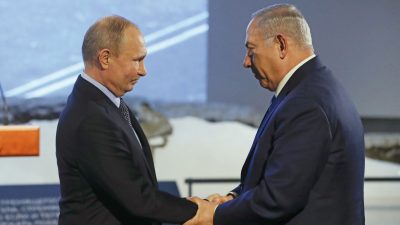Israel: “A Russian Speaking State”

All Global Research articles can be read in 51 languages by activating the “Translate Website” drop down menu on the top banner of our home page (Desktop version).
To receive Global Research’s Daily Newsletter (selected articles), click here.
Visit and follow us on Instagram at @globalresearch_crg.
***
Russian President Vladimir Putin has called Israel a “Russian-speaking state,” saying the two countries share a common history and extensive family ties.
Israel is home to the world’s largest population of Russian-speaking Jews, with ethnic Russian Jews as well as Jews from former Soviet countries making up some 17% of the country’s population. The community, which has its own distinct cultural and political identity, has been influential in Israeli society in the three decades since the first wave of mass immigration from the former Soviet Union.
The Russians in Israel are Russian citizens who are immigrants to Israel from Russian communities of the Soviet Union and post-Soviet states, and their descendants. They are mostly members of mixed families, some of them are non-Jewish members of Jewish households living in Israel. A few are descended from Russian Subbotnik families, who have migrated to Israel over the past century. People of full or partial non-Jewish ethnic Russian ancestry number around 300,000 of the Israeli population from the immigrants from the Soviet Union and post-Soviet states, and the number of Russian passport holders living in Israel is in the hundreds of thousands.
Most Russian people in Israel have full Israeli citizenship and are involved in the country’s economy on all levels. Russian Jews have been very dominant in Israeli politics, due to large number of Russian Jews occupied in the official positions of Israeli Government. Former Israeli Foreign Minister, Avigdor Lieberman, claimed ancestry from former Soviet Union’s Moldova. Many Russian Jews maintain their ties with Russia, and play an important role in the relationship between Russia and Israel.
Israel–Russia relations refer to the bilateral ties between the State of Israel and the Russian Federation. Israel is represented in Russia through an embassy in Moscow and a consulate-general in Yekaterinburg. Russia is represented in Israel through an embassy in Tel Aviv and a consulate in Haifa.
Russia is a member of the Quartet on the Middle East. For many years, Israel served as a sanctuary for Russian Jews. This was especially the case during the aliyah from the Soviet Union in the 1970s and 1990s. Israel and Russia were on opposing sides during the Cold War. However, the relationship between Israel and Russia began to improve significantly from the early 2000s onwards, with the election of the more pro-Israel Russian leader Vladimir Putin, and in 2001 with election of the more pro-Russia Israeli leader Ariel Sharon.
Israel is part Russophone and considered to be the world’s only part-Russophone country outside of the former Soviet states. The Russian language is the third-most widely spoken first language in Israel after Hebrew and Arabic; Israel has the thirdlargest number of Russian speakers outside of the post-Soviet states, and the highest as a proportion of the total population. Over 100,000 Israeli citizens live in Russia, with 80,000 Israelis living in Moscow, while hundreds of thousands of Russian citizens reside in Israel, from around 1.5 million native Russian-speaking Israelis.
In 2011, Putin said:
“Israel is, in fact, a special state to us. It is practically a Russian-speaking country. Israel is one of the few foreign countries that can be called Russian-speaking. It’s apparent that more than half of the population speaks Russian”.
Putin additionally claimed that Israel could be considered part of the Russian cultural world, and contended that “songs which are considered to be national Israeli songs in Israel are in fact Russian national songs”. He further stated that he regarded Russian-speaking Israeli citizens as his compatriots and part of the ‘Russian world’.
Notwithstanding the above, for years NATO has allowed Israeli military and espionage contractors, free access to become essential suppliers to NATO’s critical security network in Britain, Germany and the EU – whose national defence systems must now be considered compromised and ineffective thereby giving Putin, Netanyahu (and his successor), the keys to the security of all 27 EU Member States.
*
Note to readers: Please click the share buttons above or below. Follow us on Instagram, @globalresearch_crg. Forward this article to your email lists. Crosspost on your blog site, internet forums. etc.
Hans Stehling (pen name) is an analyst based in the UK. He is a regular contributor to Global Research.
Featured image is from Oriental Review

